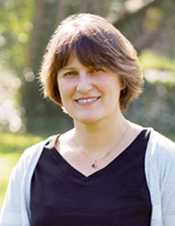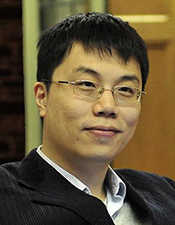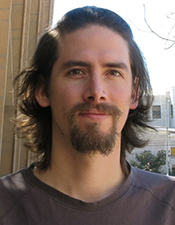Three campus researchers named 2015 Pew scholars
Three early-career researchers at UC Berkeley have been selected as this year’s Pew scholars, a program for investigators of outstanding promise in science relevant to the advancement of human health.
Pew Scholars is a program of the Pew Charitable Trusts. Founded in 1948, Pew is a nonprofit global research and public policy organization dedicated to “improving public policy, informing the public and invigorating civic life.” The program gives grants to academic institutions to support the independent research of outstanding individuals who are early in their careers.
This year’s Pew scholars are Polina Lishko and Ke Xu, both selected as two of 22 scholars to join the Pew Scholars Program in the Biomedical Sciences, and Juan-Pablo Castillo, one of 10 postdoctoral scientists to join the Pew Latin American Fellows Program in the Biomedical Sciences.
Here is a look at Berkeley’s 2015 Pew scholars:
 Polina Lishko, an assistant professor of molecular and cell biology, will be exploring the pathways of progesterone signaling, an unconventional mechanism that adjusts pain thresholds in the nervous system, and regulates sperm activation and egg maturation in the reproductive tissues. Findings could lead to the development of new diagnostics or treatments for male infertility, help develop safe male contraceptives and devise novel strategies to manage pain.
Polina Lishko, an assistant professor of molecular and cell biology, will be exploring the pathways of progesterone signaling, an unconventional mechanism that adjusts pain thresholds in the nervous system, and regulates sperm activation and egg maturation in the reproductive tissues. Findings could lead to the development of new diagnostics or treatments for male infertility, help develop safe male contraceptives and devise novel strategies to manage pain.
 Ke Xu, an assistant professor of chemistry, uses sophisticated, super-resolution microscopy and single-molecule techniques to probe how a cell’s “skeleton,” known as its cytoskeleton, organizes its interior and determines its shape. His work will lead to a deeper understanding of cytoskeletal structure and function and could spur the development of drugs that eradicate cancers by interfering with their cytoskeletal organization.
Ke Xu, an assistant professor of chemistry, uses sophisticated, super-resolution microscopy and single-molecule techniques to probe how a cell’s “skeleton,” known as its cytoskeleton, organizes its interior and determines its shape. His work will lead to a deeper understanding of cytoskeletal structure and function and could spur the development of drugs that eradicate cancers by interfering with their cytoskeletal organization.
 Juan-Pablo Castillo received a Ph.D. in molecular and cellular biology from the University of Chile. Castillo will conduct postdoctoral research in biochemistry with Carlos Bustamante, a Howard Hughes Medical Institute investigator and professor of molecular and cell biology, physics and chemistry.
Juan-Pablo Castillo received a Ph.D. in molecular and cellular biology from the University of Chile. Castillo will conduct postdoctoral research in biochemistry with Carlos Bustamante, a Howard Hughes Medical Institute investigator and professor of molecular and cell biology, physics and chemistry.
The Bustamante lab explores how viruses use cellular machinery to package their genetic material. Using a combination of methods that rely on biochemistry and single-molecule manipulation, Castillo plans to determine how the subunits coordinate their activity and what conditions will cause the motor to fail. These findings could lead to novel strategies to block viral infections, including those that cause the flu and herpes as well as respiratory ailments.
Learn more about the Pew Charitable Trusts on the organization’s website.
